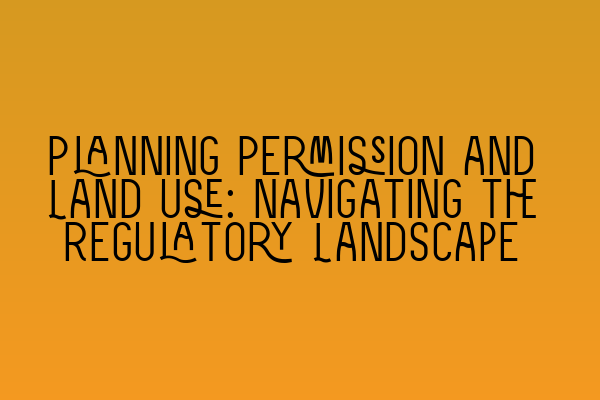Planning Permission and Land Use: Navigating the Regulatory Landscape
Welcome to the blog of SQE Property Law & Land Law, your trusted solicitor for all matters related to property and land law. Today, we want to discuss an important topic that affects many property owners and developers: planning permission and land use.
Obtaining planning permission is a crucial step in any construction or development project. It ensures that the proposed use of the land is in compliance with local regulations and policies. Without planning permission, you may face legal consequences and have to halt your plans.
The Importance of Planning Permission
Planning permission serves multiple purposes. It helps to control development and protect the environment, ensuring that any changes to the land are in line with the local planning policy. It also helps to manage the growth and use of land, ensuring that neighborhoods maintain their character and functionality.
By obtaining planning permission, you can be confident that your project is legal and will not face opposition from local residents or organizations. It provides clarity and transparency, giving stakeholders a chance to voice their concerns and making them aware of the proposed changes.
However, obtaining planning permission can be a complex process filled with legal jargon and bureaucratic procedures. That’s where SQE Property Law & Land Law can help. Our team of experienced solicitors specializes in navigating the regulatory landscape and ensuring that our clients’ planning applications are successful.
Understanding the Regulatory Landscape
To successfully navigate the regulatory landscape, it’s important to have a clear understanding of the relevant laws and policies. Local authorities enforce planning regulations, and it’s crucial to comply with their requirements throughout the application process.
One key consideration is the local development plan, which outlines the planning policies for a specific area. It provides guidance on land use, design, and infrastructure requirements. Understanding the local development plan and aligning your proposed project with its objectives significantly improves your chances of obtaining planning permission.
Additionally, there may be national policies and legislation that apply to your project. These can include guidelines on sustainability, heritage conservation, or flood risk assessments. By staying informed about these regulations, you can address any potential concerns in your planning application.
The Planning Permission Process
The planning permission process involves several stages, and it’s important to follow each one carefully:
- Initial Consultation: Before submitting a formal application, it can be beneficial to engage in an initial consultation with the local planning authority. This allows you to discuss your proposal and receive feedback.
- Preparation and Submission of Application: Once you have a well-developed project plan, you can prepare and submit your planning application. This typically includes completing application forms, providing supporting documents, and paying the required fees.
- Public Consultation: In some cases, the planning authority may require public consultation. This involves notifying neighboring properties and giving them an opportunity to comment on the proposed development.
- Assessment and Decision: The planning authority will assess your application, considering factors such as impact on the environment, traffic, and community. They will then make a decision to grant or refuse planning permission.
- Appeals: If your application is refused, you have the right to appeal the decision. SQE Property Law & Land Law can support you through the appeals process, helping you present a strong case for approval.
Navigating this process can be overwhelming, but with the right legal support, it becomes more manageable. SQE Property Law & Land Law has a proven track record of successfully guiding clients through the planning permission process, ensuring they achieve the outcomes they desire.
Conclusion
Planning permission and land use regulations are vital considerations for anyone involved in property development. They help maintain order, protect the environment, and preserve the integrity of local communities.
If you are embarking on a development project and need guidance on planning permission and land use, look no further than SQE Property Law & Land Law. Our team of experienced solicitors are well-versed in the regulatory landscape, and will provide you with expert advice and assistance throughout the process.
For more information on related topics, be sure to check out our articles:
- Understanding Contractual Capacity: Rights and Limitations
- Interactive SQE Mock Tests for Contract Law: Test Your Knowledge
- Join Our SQE Contract Law Webinars: Expert Insights and Guidance
- Contract Law Reforms: An Analysis of Recent Changes
- Parties in a Contract: Rights and Responsibilities
Contact SQE Property Law & Land Law today and let us help you navigate the regulatory landscape and achieve your property development goals.
